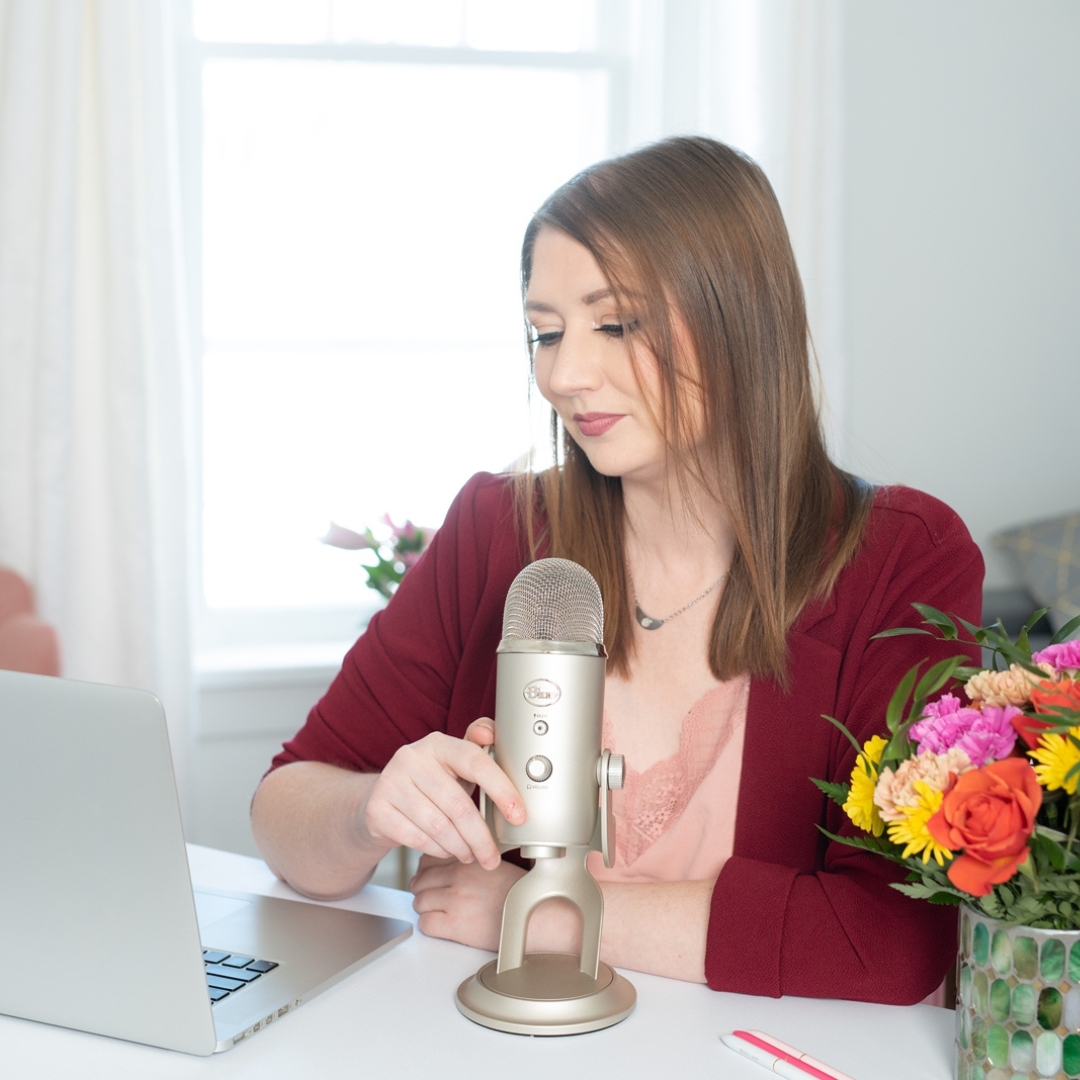Struggling to get the results you want from your emails?
Discover 15 simple yet powerful ways to elevate your email marketing and start seeing real engagement!
Grab your freebie!
Blog Categories
Helping small business owners, virtual assistants, and creative entrepreneurs grow their business.
Hi, I'm Tara! I'm a multi-passionate business and marketing coach.
learn more + get a copy:
Last Updated on October 13, 2025 by Tara Reid
A few months ago, I opened my podcast episode list and realized something surprising. I hadn’t recorded a solo episode in over three months. Every single recent episode was a guest interview.
Disclaimer: I earn from qualifying purchases. Some of the links on my website are affiliate links, which means, at no additional cost to you, I will earn a small commission if you click through and make a purchase.
At first, I told myself this was fine. I love having guests on. They bring fresh perspectives, new stories, and the kind of organic conversation that feels easier for me as an introvert. But somewhere along the way, my own voice had taken a backseat.
It wasn’t intentional, but I could feel the shift.
I started to wonder: was my audience still hearing from me, or were they only getting my thoughts in short bursts between guest answers?
In this post, I’m pulling back the curtain on what’s worked for me as an introverted podcast host, why I’m shifting back toward more solo content, and how I’m finding a balance that keeps my podcast both sustainable and fulfilling.
- Why I Leaned So Heavily Into Guest Episodes
- The Downside of Too Many Guest Episodes
- Why I’m Bringing Solo Episodes Back
- How I’m Balancing Solo and Guest Episodes Now
- Lessons Learned as an Introverted Podcast Host
- Final Thoughts
- FAQ: Solo vs Guest Podcast Episodes
- 1. Which is better: solo or guest podcast episodes?
- 2. How do I get comfortable recording solo episodes?
- 3. How do guest episodes help grow a podcast?
- 4. Do solo episodes perform better than guest episodes?
- 5. What’s the best mix of solo vs guest content?
- 6. Are solo episodes easier to produce than guest episodes?
- 7. Can I run a podcast entirely with solo episodes?
Why I Leaned So Heavily Into Guest Episodes
When I first started the Introvertpreneur Podcast, I imagined a healthy mix of solo episodes and guest interviews. But over time, guest episodes started to dominate my publishing calendar… and it wasn’t entirely by accident.
The Comfort Zone Factor
As an introvert, sitting down to record a solo episode can sometimes feel like standing on a stage with no script. Guest interviews, on the other hand, feel more like a coffee chat. There’s someone to bounce ideas off of, and the pressure isn’t all on me to carry the conversation for 20 or 30 minutes.
The truth? Guest episodes often felt easier. I didn’t have to outline every word or worry about keeping the energy up on my own. I could show up, ask thoughtful questions, and let the conversation flow.
The Benefits of Guest Interviews
There’s no denying that guest episodes have real value, both for the host and the audience.
- Fresh perspectives: Guests bring their own experiences, expertise, and stories, which can give listeners new insights.
- Networking opportunities: Every interview builds a relationship, which can lead to collaborations, referrals, or even friendships.
- Audience growth: Guests often share the episode with their own networks, helping introduce your show to new listeners.
For a while, it felt like a win-win. I was connecting with incredible people, offering my audience valuable content, and avoiding the “blank mic” anxiety of solo recording.
But eventually, I started to see the cracks in this approach… and that’s where the shift began.

The Downside of Too Many Guest Episodes
As much as I love having guests on the podcast, I started to notice some drawbacks when they became the default format instead of an intentional choice.
Losing My Own Voice in the Mix
One day, I realized I had gone three full months without publishing a single solo episode. That meant new listeners were meeting my podcast through other people’s voices first — not mine.
While guest interviews are great for variety, too many can unintentionally push the host into the background.
My own stories, insights, and strategies were getting little moments here and there, but not the full focus they deserved. And for a show that carries my name and brand, that didn’t feel aligned.
More Complex Logistics
Guest episodes may be easier conversationally, but they often require way more behind-the-scenes work:
- Scheduling (and rescheduling) across time zones
- Prepping questions and outlines for each guest
- Doing tech checks to ensure good audio quality
- Editing two voices instead of one
When you add in my goal of keeping podcasting simple and sustainable, all those extra moving pieces started to feel heavy. And as an introvert, the additional outreach and coordination wasn’t exactly energizing.
It became clear that if I wanted podcasting to stay fun and consistent for me, I needed to rethink my balance of guest vs solo content.
Why I’m Bringing Solo Episodes Back
Once I saw how much my solo episodes had been pushed aside, I knew it was time to shift the balance. Guest interviews are still valuable, but I wanted to make sure my voice (my ideas, my strategies, my behind-the-scenes) had space to breathe again.
Shorter, More Sustainable Content
One of the biggest appeals of solo episodes is how quick and easy they are to produce. I can batch several in one sitting, keep them between 5–15 minutes, and have weeks of content ready without spending hours on scheduling or editing.
That lighter workload makes it so much easier to stay consistent. And for me, consistency without burnout is the real win.
Building Deeper Connection With My Audience
When it’s just me and the mic, there’s nowhere to hide… and that’s actually a good thing. Solo episodes allow me to speak directly to my listeners, share personal stories, and dive deeper into topics I care about without worrying about steering a conversation.
I’ve found that these episodes often get the most feedback from my audience because they feel more personal and connected. Listeners get to hear my unfiltered thoughts and experiences, which builds trust in a way that guest episodes can’t always match.
How I’m Balancing Solo and Guest Episodes Now
Instead of letting guest interviews fill my entire schedule by default, I’ve flipped my approach: solo episodes are now the foundation of my podcast, and guest episodes are the intentional “extras” I sprinkle in.
Solo as the Default
Most weeks, you’ll now hear a short solo episode (usually between 5 and 15 minutes) where I share a quick strategy, behind-the-scenes story, or personal insight. These are easy to batch, quick to edit, and keep my voice front and center for my audience.
Guest Episodes as Strategic Additions
When I do bring on guests, it’s because they genuinely add something valuable to the conversation. I’m choosing topics where their expertise complements my own, or where their story can inspire my listeners in a way I can’t on my own.
Instead of filling the calendar, guest episodes now enhance it. And I’m more intentional about spacing them out so the show never loses its identity.
Managing Length and Energy
I’ve also adjusted my expectations for episode length:
- Solo episodes: 5–15 minutes, short and actionable.
- Guest episodes: ~30 minutes, giving time for depth without overwhelming listeners.
This structure not only helps me manage my own energy as an introvert, but it also keeps things consistent and predictable for my audience.

Lessons Learned as an Introverted Podcast Host
After experimenting with both solo and guest-heavy formats, I’ve learned that the best podcasting strategy isn’t about choosing one over the other. It’s about finding a balance that feels good, fits your energy, and serves your audience.
1. Don’t Underestimate Your Own Voice
It’s easy to think guests will always bring more value because they have different expertise or stories. But your audience tunes in because of you. Your voice, perspective, and lived experiences are just as valuable (if not more) than anything a guest can bring.
2. Both Formats Have Their Place
Guest episodes are incredible for connection, variety, and collaboration. Solo episodes build authority, trust, and a direct relationship with your listeners.
The magic happens when you use each format with intention, not out of habit.
3. Simplify the Workflow for Both
Whether solo or guest, the process needs to work for you. Keep your systems light, your recording schedule realistic, and your editing minimal. The simpler your process, the more likely you are to stick with it long-term.
Final Thoughts
Podcasting as an introvert can be both deeply rewarding and surprisingly draining… depending on how you structure it. For a while, I leaned heavily into guest interviews because they felt easier and less pressure-filled. But over time, I realized I was giving away too much space to other voices and letting my own get lost in the mix.
Shifting back to a solo-first approach has brought my podcast back into alignment with my goals, energy, and audience connection. Guests still play an important role, but they’re now chosen with intention, not just to fill the schedule.
If you’re a fellow podcaster, or thinking about starting one, I encourage you to look at your own mix of solo and guest episodes.
Which ones light you up? Which feel heavy? And what balance would make your podcast feel sustainable and exciting again?
Because at the end of the day, it’s your show.
You get to decide what works for you.
Want to hear this balance in action? Check out recent episodes of the Introvertpreneur Podcast to see how I’m mixing short, value-packed solos with intentional guest features.
Need more sustainable content strategies? Join us inside the Introvertpreneur Club, where we make marketing feel lighter, more aligned, and a lot more fun.

FAQ: Solo vs Guest Podcast Episodes
1. Which is better: solo or guest podcast episodes?
Neither format is inherently better. It depends on your goals and your audience. Solo episodes are great for building authority, sharing personal stories, and creating deeper connections with listeners. Guest episodes are ideal for introducing fresh perspectives, building relationships, and reaching new audiences through cross-promotion.
2. How do I get comfortable recording solo episodes?
Start small with short, 5–10 minute solo episodes on topics you know well. Outline a few bullet points instead of scripting word-for-word, and remember that your listeners value your voice and perspective. Over time, solo episodes will feel more natural.
3. How do guest episodes help grow a podcast?
Guest episodes can expand your reach because your guests often share the episode with their own audiences. They also add credibility to your show by featuring recognized names in your industry and offer your listeners new ideas and experiences.
4. Do solo episodes perform better than guest episodes?
It depends on your audience and niche. Many hosts find that solo episodes generate stronger engagement because they focus entirely on the host’s expertise. However, guest episodes can attract new listeners who may not have found your podcast otherwise.
5. What’s the best mix of solo vs guest content?
A balanced approach works well for most podcasters. For example, you might release two or three solo episodes for every guest episode. This keeps your voice front and center while still benefiting from the variety and reach guests can provide.
6. Are solo episodes easier to produce than guest episodes?
Usually, yes. Solo episodes often require less scheduling, less editing, and fewer technical considerations. Guest episodes involve coordination, prepping questions, and managing multiple audio tracks, which can add time and complexity.
7. Can I run a podcast entirely with solo episodes?
Absolutely. Many successful podcasts are 100% solo. The key is to keep the content engaging by mixing up your formats. Try storytelling, quick tips, Q&A sessions, or deep dives into specific topics.
Tara Reid is a multi-passionate business and marketing strategist for introverted entrepreneurs who want to grow without relying on hustle culture or social media. With 18+ years of online business experience, she helps course creators, service providers, and digital product sellers build sustainable businesses through evergreen marketing, blogging, SEO, Pinterest, and email.
As the founder of the Introvertpreneur Club, Tara’s mission is to show heart-centered entrepreneurs that you don’t have to be loud to be successful. You just need the right strategies that fit your personality.
When she’s not supporting clients or creating new resources, you can find her at home in Canada with her three rescue dogs, a cup of coffee in hand, dreaming up her next project.
The Introvertpreneur Podcast
listen in to the top rated business podcast that is designed for introverted entrepreneurs who want to grow + scale in a more sustainable and fun way!
Top rated podcast
This one's on me. Complimentary free stuff coming right up.
leaving so soon?
Look behind the curtain and see exactly what I do every week, month, and quarter, to market my business without social media (in under 5 hours per week)!
The Quiet Marketing Playbook
Take this free quiz and learn what your superpower is as an entrepreneur. You'll also get a curated list of my best resources and tips for using your superpower to your advantage!
What's your Introverted Superpower?
Best Free Resources:
dig into 'em now!
A business strategist and marketing coach who focuses on helping course creators, coaches, and service providers, build sustainable businesses without social media.
